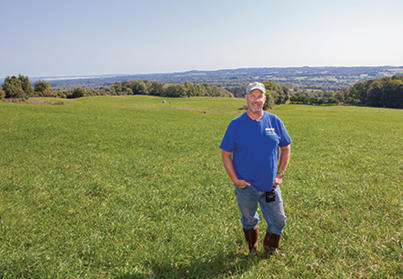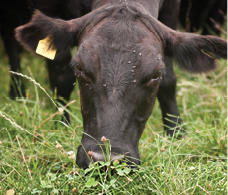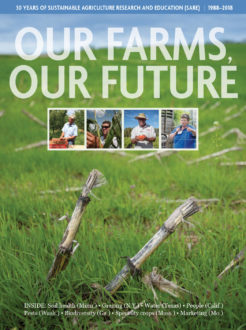Learn about SARE's broader impact on grazing in the United States.
"I was able to spend time with these producers and really get to know them. They have found a way to manage their grazing system that works for them personally, environmentally and financially."
Tricia LaValley, Franklin County Soil and Water Conservation District, New York
The Challenge

The rising costs of energy, feed and fertilizers are slimming margins in the beef and dairy industries. That, plus the willingness of many consumers to pay more for pasture-raised meat and dairy products, is causing Northeast farmers to think more about adopting grazing systems. A main appeal is that these systems typically have a higher profit margin than confinement systems.
But the number of service providers who have the knowledge to assist these farmers with holistic grazing planning and management strategies is at an all-time low. To keep up the momentum toward adoption of pasture-based systems, more service providers need training and tools to assist farmers in creating tailored plans.
The Actions Taken
A SARE-funded team of service providers trained 35 colleagues throughout New York, Pennsylvania and Vermont to become “local grazing champions” qualified and confident to help beef and dairy producers discover the benefits of planned grazing with the goal of increasing on-farm profitability, ecological health and quality of life.

The team developed a curriculum and teaching materials—including a comprehensive grazing chart—on communication, pasture infrastructure, animal behavior and nutrition, weed management, estimating pasture production and implementing a grazing chart. Training occurred over three years through 94 unique venues, including workshops, field days, pasture walks, conferences, in-field consultations and videos. Each participating service provider committed to six training sessions and to working with three farmers to develop holistic grazing plans for their operations.
The Impacts
This SARE Professional Development Program grant, led by Troy Bishopp of the Madison County Soil and Water Conservation District in New York, had a tremendous impact on both participating service providers and farmers. Participants, armed with new knowledge and planning strategies, reported changing their approach to working with farmers, and farmers achieved positive outcomes for their operations.
- Widespread adoption: The 35 participants completed grazing plans on a combined 70 farms. More than 1,040 people, including 794 farmers, benefited from the training in some capacity.
- New tools: More than 600 grazing charts were downloaded or delivered to farmers.
- Profitability and conservation: Farmers reported economic benefits, such as increased revenue or savings resulting from more careful planning, as well as environmental benefits, including increases in ground cover and biological activity, and improved soil and forage health.
Learn More
Visit the database of project reports to learn more about this SARE-funded project: ENE10-115.
